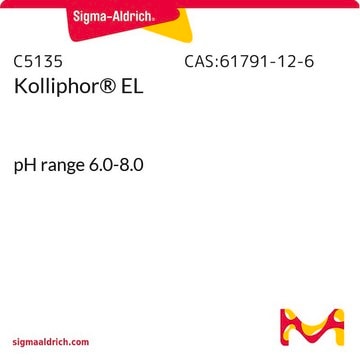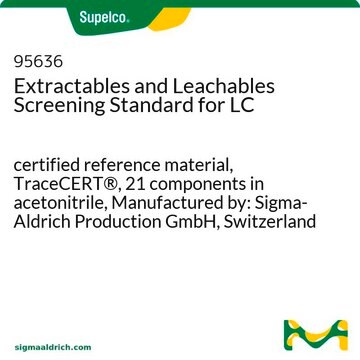57668
D-α-Tocopherol polyethylene glycol 1000 succinate
BioXtra, water soluble vitamin E conjugate
Synonym(s):
D-α-Tocopherol polyethylene glycol succinate, TPGS, Vitamin E polyethylene glycol succinate, Vitamin E-TPGS
About This Item
Recommended Products
biological source
synthetic
product line
BioXtra
form
powder, crystals or chunks
composition
α-tocopherol, ≥25%
concentration
≥25% (ALPHA TOCOPHEROL)
color
white to light brown
mp
>36 °C
solubility
H2O: 1 g/10 mL, clear to faintly turbid, colorless to faintly yellow
cation traces
Al: ≤5 mg/kg
Ba: ≤5 mg/kg
Bi: ≤5 mg/kg
Ca: ≤5 mg/kg
Cd: ≤5 mg/kg
Co: ≤5 mg/kg
Cr: ≤5 mg/kg
Cu: ≤5 mg/kg
Fe: ≤5 mg/kg
K: ≤50 mg/kg
Li: ≤5 mg/kg
Mg: ≤5 mg/kg
Mn: ≤5 mg/kg
Mo: ≤5 mg/kg
Na: ≤50 mg/kg
Ni: ≤5 mg/kg
Pb: ≤5 mg/kg
Sr: ≤5 mg/kg
Zn: ≤5 mg/kg
storage temp.
2-8°C
SMILES string
CC1=C(C(=C(C2=C1OC(CC2)(C)CCCC(C)CCCC(C)CCCC(C)C)C)OC(=O)CCC(=O)OCCO)C
InChI
1S/C35H58O6/c1-24(2)12-9-13-25(3)14-10-15-26(4)16-11-20-35(8)21-19-30-29(7)33(27(5)28(6)34(30)41-35)40-32(38)18-17-31(37)39-23-22-36/h24-26,36H,9-23H2,1-8H3
InChI key
AOBORMOPSGHCAX-UHFFFAOYSA-N
Looking for similar products? Visit Product Comparison Guide
Related Categories
General description
Moreover, Tocofersolan acts as an inhibitor of P-glycoprotein (P-gp or MDR1) substrate-induced ATPase activity in cell-free assays. It has demonstrated efficacy against resistant K562 cells by binding to urokinase-type plasminogen activator, a crucial enzyme for cancer cell migration and invasion. Additionally, Tocofersolan inhibits tyrosine kinase, a key player in cancer cell development, offering potential applications in metabolomics and biochemical research. Its ability to enhance the absorption of water-insoluble agents and other fat-soluble vitamins positions it as a promising compound for formulation and drug delivery research.
Application
Biochem/physiol Actions
Tocopherol polyethylene glycol 1000 succinate (TPGS) may be used to create biodegradable polymers and antioxidant surfactants.
TPGS exerts anti-tumor activity in MCF-7 and breast cancer cells by downregulating anti-apoptotic proteins.
TPGS finds its application as an emulsifier in the preparation of poly(lactic-co-glycolic acid) (PLGA) particles for DNA labelling, produces particles of uniform size, high encapsulation efficiency, increases hydrophilicity and prevents aggregation of particles.
Features and Benefits
- Can be used in Metabolomics and Biochemical research
- High-quality compound suitable for multiple research applications
Other Notes
Storage Class Code
11 - Combustible Solids
WGK
WGK 2
Flash Point(F)
>392.0 °F
Flash Point(C)
> 200 °C
Personal Protective Equipment
Certificates of Analysis (COA)
Search for Certificates of Analysis (COA) by entering the products Lot/Batch Number. Lot and Batch Numbers can be found on a product’s label following the words ‘Lot’ or ‘Batch’.
Already Own This Product?
Find documentation for the products that you have recently purchased in the Document Library.
Customers Also Viewed
Our team of scientists has experience in all areas of research including Life Science, Material Science, Chemical Synthesis, Chromatography, Analytical and many others.
Contact Technical Service











